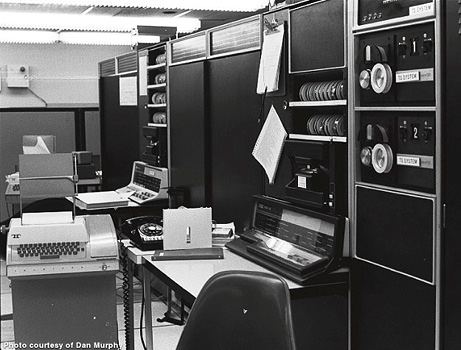
Internet Turns 40: First Message Crashed System
Ker Than
for National Geographic News
Updated 4:15 p.m. ET, October 29, 2009
Everyone surfing for last-minute Halloween costumes and pictures of black Lolcats this week—what you might call the 40th anniversary of the Internet—can give thanks to the simple network message that started it all: "lo."
On October 29, 1969, that message became the first ever to travel between two computers connected via the ARPANET, the computer network that would become the Internet.

The truncated transmission traveled about 400 miles (643 kilometers) between the University of California, Los Angeles, and the Stanford Research Institute. (Watch video about the birth of the Internet.)
The electronic dispatch was supposed to be the word "login," but only the first two letters were successfully sent before the system crashed.
Still, that humble greeting marked the start of a phenomenon that has become such an important part of modern life that many experts argue access to it should be a right rather than a privilege.
In fact, earlier this month Finland became the first country in the world to declare broadband Internet access a legal right for all of its 5.2 million citizens.
"I don't think it's quite on the level of food and water yet, but it's pretty close," said Jeffrey Cole, director of the Annenberg School for the Digital Future at the University of Southern California.
Packet Technology and the Birth of the Internet
Created by the U.S. Department of Defense's Advanced Research Projects Agency, the original ARPANET was a network of just four computer terminals installed at universities and research institutions in California and Utah.
Internet 40th Anniversary Video: Birth of the Internet
With its truncated missive 40 years ago Thursday, ARPANET became the world's first operational packet-switching network.
"Packet-switching was the original transmission mechanism [for our network] in 1969 and is still the underlying technology of the Internet today," said Leonard Kleinrock, a UCLA computer engineer who was involved in ARPANET's creation.
In a packet-switched connection, a message from one computer is broken down into chunks, or packets, of data and sent through multiple routes to another computer.
Once all the packets arrive at their destination, they are pasted back together into the original message.
"It's as if a long letter were written on a series of small postcards, and each postcard was mailed separately," Kleinrock said.
Packet-switching replaced a less efficient and less flexible transmission technology used by early telephone companies called circuit-switching, which relied on dedicated connections between two parties.
"When you and I talk over a circuit-switched connection, that connection is totally dedicated to our conversation," Kleinrock explained. "Even if we pause to take a coffee break, the connection is still ours and sits by idly while we are silent."
By contrast, data packets in a packet-switched transmission have multiple routes open to them and will hop on to the one with the least amount of traffic. In this way, no route is idle for long.
40 Years Later, No One Owns the Internet
In the years following ARPANET's deployment, other packet-switching networks were created, but they were internal networks that had only limited access to one other.
It wasn't until the mid-1970s that engineers developed a way to merge networks to create the Internet.
In 1984 the domain system that includes .com, .gov, and .edu was established. A decade after that, the first commercial web browser, Netscape, became available.
Today the Internet is accessed by more than a billion users monthly.
Several companies and organizations contribute to its upkeep and operation. But no one owns the Internet, since anyone with access to a computer can create Web content.
"If you put your PC out there and offer a news service or something … then you're considered a part of the Internet," Kleinrock said.
Transformed World Marks Internet's 40th Anniversary
Although it's now hard to imagine life without Facebook, Google, and Wikipedia, the broad appeal of the Internet was something many of its inventors never predicted.
"I am surprised, and totally pleased, at how effective the Internet has been in allowing communities of people to form, communicate, exchange ideas, and enter their daily lives in so many ways," Kleinrock said.
(Related: "Googling Fights Dementia, Study Suggests.")
For the last decade, a team led by the University of Southern California's Cole has been tracking the effect of the Internet on societies around the world.
"When we started in 1999, it was already clear that the Internet was going to transform communications," Cole said.
"What we could never have imagined is that it would transform virtually every element of business and social activity."
Cole predicts that in the future, more people will access the Internet through mobile devices such as the iPhone than via personal computers and laptops.
Currently about four billion people around the world have mobile phones, but only about a billion people use PCs, Cole noted.
"We think the Internet is moving completely toward mobile."
(http://news.nationalgeographic.com/news/2009/10/091029-internet-40th-anniversary-birthday.html)